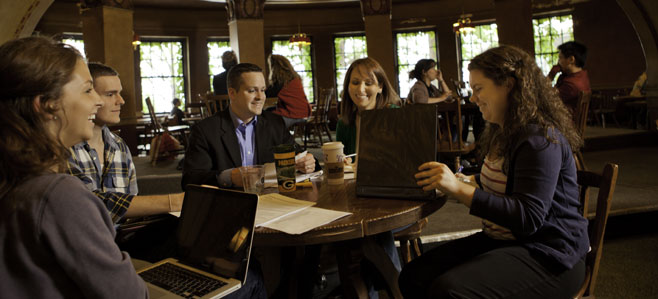
A privately funded start-up package helped convince Lyons Family Faculty Scholar Ryan Owens, center, to move from Harvard University to the UW-Madison Department of Political Science.
Presented with the opportunity to hire six new professors, John Coleman, chair of the Department of Political Science at the University of Wisconsin-Madison, faced “a little bit of a puzzle.”
The new faculty lines allowed him to fill teaching gaps in one of the country’s top political science departments. To put competitive offers on the table, he also needed adequate start-up packages, which provide funding to establish research programs. The start-up funding allows professors “to come here and hit the ground running on their research,” Coleman said.
That’s where Robert and Susan Trice and Jeffrey and Susanne Lyons stepped in, making key gifts to recruit and retain faculty. Coleman went six for six, bringing in top scholars on topics from Latin American to judicial politics. He also had private dollars to encourage Scott Straus, a world-recognized scholar on genocide and ethnic conflict in Africa, to remain in Madison.
Public institutions like the UW-Madison are essential to educate a “citizenry with all of the skills needed to compete in the 21st century,” said Robert Trice (’71 MA, ’74 PHD L&S), a retired vice president with Lockheed Martin Corp. Gifts allow public universities to successfully compete with well-endowed private institutions for the best minds in the world. The success of the gift can be found in the university’s successful recruitment of world-class talent, he said.
With the retention package, Straus, whose book “The Order of Genocide: Race, Power, and War in Rwanda” won a 2006 Award for Excellence from the Association of American Publishers, stayed in Madison without sacrificing “any part of my research agenda or feeling that I was being penalized for my commitment to the institution.” The package also showed him that the university valued his work at a time when other institutions were signaling their interest. Research funds allow Straus to travel to Africa for research, attend conferences, purchase supplies and support graduate students.
New faculty members pose questions that will help students and the public better understand the world. What is the connection between political beliefs and union membership? Do lower court judges’ rulings change when Supreme Court openings are expected?
The start-up package shows UW-Madison is committed to continued research, said Ryan Owens, a Lyons Family Faculty Scholar. With the start-up plus external grants, he hired undergraduate assistants and lost no research ground in his move from assistant professor of government at Harvard. Owens’ latest book, “The Solicitor General and the United States Supreme Court: Executive Branch Influence and Judicial Decisions,”was published in April.
The unrestricted gifts allow Coleman to use the funds for his highest priorities – faculty support and graduate funding. Top faculty help the department successfully compete for top students against Harvard, Princeton, Yale and Stanford, he said. “We don’t need to match offers dollar for dollar, but we need to be within shouting distance.” An additional unrestricted Trice gift increased teaching assistant and fellowship stipends and provided seed funding for summer research.
